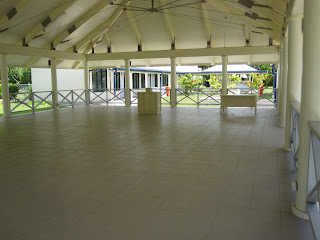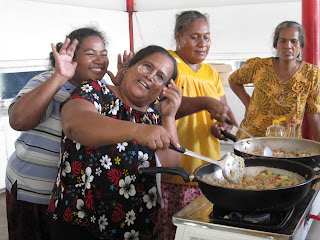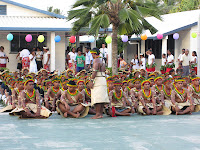We got our luggage the Monday after we arrived -- just like Pacific Air promised. We have been getting used to the heat and getting to know the island.
So far, our assignment is to oversee the finances for the missionaries (making sure they get $217/month, plus get their rent paid), make sure their flats are kept in good repair and that the missionaries keep them clean; and make sure the branches outside the stakes get their budget allotments. Overseeing the flats is a little challenging because there are no addresses in Kiribati. Many of the people live in bujos, raised platforms with roof and sometimes part of a wall. The missionaries' flats are supposed to be better than that -- have a door that locks, a stove, bathroom and water. The water, however, is usually rainwater. Because there are no mountains and the elevation is so low, ground water is brackish and fresh water must be collected off the roofs, which runs into large barrels. We are now in the rainy season, so it has been raining a couple of times a day for about 10-15 minutes each -- sometimes pretty hard.

The house on the left is built on reclaimed land. They build a wall into the ocean and then fill it in to provide a space to erect a shelter. You can see the beginning of the process below.
The people here are a handsome, happy people, though. There are 7 LDS chapels on the island, strung out about every 4-5 miles because most have to walk everywhere. The chapel below shows the ocean in front, just across the road. The ocean is also in back of the church at this narrow part of the island.
Thatched roof house.
Missionary apartments are
nicer and require a door that locks.
These were people lined up to see the plane land. They usually get 2 per week.
These Relief Society sisters were attending a cooking class, sponsored by the Taiwanese government as a humanitarian effort of teaching them to cook nutritious meals using vegetables they are helping the local people to raise.
The Taiwanese do a lot for this island, we think because Kiribati gives them fishing rights in their waters. They provide vegetable starts, training, and other resources.
The young woman on the left is Sister Tira (pronounced Seera), who served a mission in Oakland, California. Sis. Kunz in the Rexburg temple knew her during their mission and asked Judy to find her and give her a hug. We found her and her sister running their mother's roadside store, shown on their right, when we stopped to buy some bananas. She actually started the conversation asking us where we were from because of our missionary name tags. When she found we were from Idaho, she asked if we knew Sister Kunz. What are the chances!!!
The sister missionaries had 4 people baptised in the ocean right behind our flat. The missionary on the left is from Fiji and has a New Zealand accent. The sister on the right is a native Kiribati girl. The man in the back is a member of the church who baptised them.
Ture works on campus and had a student get a pandana fruit down for us to try. He is breaking it apart.
The orange part is chewed for the sweet juice that comes from it, but the texture is like the core of a pineapple, only tougher. Some say it is natural dental floss. The people have wonderful teeth, as a whole, but if they get a cavity, they just pull the tooth because there are no dentists here. Consequently, when people get older, you start seeing missing teeth
The East Stake had a cultural night of native singing and dancing that was outstanding. The group to the left are the Eita 2nd Ward. The man facing them is their leader. The costumes are made of flowers and leaves.
This young man let me take his picture. The head band is woven leaves. The lei is flowers and leave. He has arm bands made of trimmed dry leaves to make flower-like shapes.
This is NOT how they dress. These are traditional costumes for dances from their old culture. The everyday dress is a shirt and shorts to the knees.
Each ward's dancers were stationed around the court. Honored guests (missionaries and government officials) were seated on the right, where you see our chairs turned upside down. We went under trees when a heavy rain started. The dancers stayed in their formations until the rain stopped and then went on with the performances after we went back to our seats.
The big palm trees you see in the center back are right in front of our flat.
The first group to dance gave us their head pieces as they finished their dance. I have never seen anything like these people for their graciousness, politeness and enthusiasm.
One of the groups posed for a picture for us after the festival. Fun people who enjoyed what they were doing and the fellowship with other members from all over the stake, which covered the eastern half of the island.
We had a rich cultural experience with all the wards in the Tarawa East Stake performing dancing and singing in an annual competition. What a performance!! The Polynesian Culture Center has nothing over these people.
We actually do some work here, too. Our responsibilities are to take care of missionary apartments, their repairs, rent payments and missionary care of their flats. We also help get money to the outer island branches and are available to help missionaries, leaders and members. We have begun meeting the bishoprics, going to 3 churches a week and met with the stake president today for things he sees we could help with. We gave him a list of things we could do and he got pretty excited. He is a very sharp person and has real vision for his people and the people of Kiribati in general. He would like us to teach music, dancing and financial principles and has scheduled a July 24th celebration that we are going to get youth ready to dance pioneer dances at. We will be teaching piano to small groups so they have their own people to accompany their meetings. People here go into debt, too, and they need help with that. We can see our time getting very busy.
We love it here -- the members, the leaders, the missionaries all are so great to work with and appreciate even little things so much. Missionaries who come here from the States will never be the same in understanding how much we are blessed, and also how happy we can be with very little of this world's goods.































